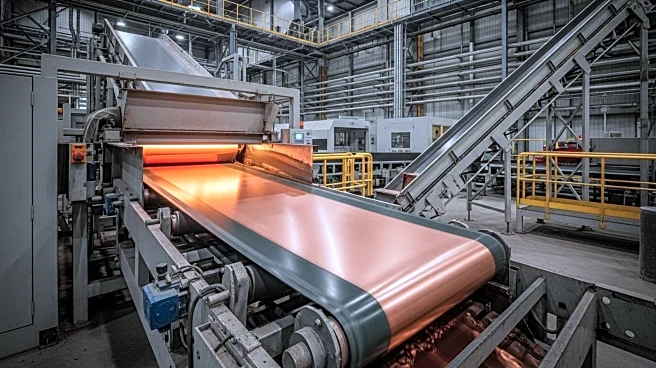What is the story about?
What's Happening?
Aurubis AG, Europe's largest copper producer, has commenced operations at its newly established metal recycling facility in Richmond, Georgia. The plant represents an $800 million investment and is designed to process up to 180,000 metric tons of complex waste recycling material annually, including printed circuit boards and copper cables. The facility will produce 70,000 tons of high-grade blister copper with a purity of 98-99%, along with nickel, tin, and precious metals. Aurubis plans to sell the copper primarily to US customers, addressing the growing demand for strategic metals in the country. The plant is expected to reach full production capacity by the first half of 2026.
Why It's Important?
The opening of Aurubis' recycling plant is significant for the US metal industry, as it aims to reduce the country's reliance on copper imports. Currently, the US demands approximately 1.8 million tons of copper annually, with about half being imported. By increasing domestic production, the plant could help stabilize supply chains and reduce import costs. Additionally, the facility supports the recycling of complex waste materials, contributing to environmental sustainability. The move aligns with broader efforts to enhance the US's strategic metal supply and could potentially lead to further investments by Aurubis in the American market.
What's Next?
Aurubis CEO Toralf Haag has indicated that the company may explore additional projects in the United States, given the favorable conditions and availability of recycling materials. This could lead to further expansion of Aurubis' operations in the US, potentially increasing domestic production of strategic metals. The success of the Richmond plant could also encourage other companies to invest in similar recycling initiatives, further bolstering the US metal industry and reducing dependency on imports.
Beyond the Headlines
The establishment of the Richmond plant highlights the growing importance of recycling in the metal industry, as companies seek sustainable solutions to meet demand. The facility's ability to process complex waste materials not only supports environmental goals but also represents a shift towards more efficient resource utilization. This development may influence regulatory policies and encourage investment in recycling technologies, fostering innovation and sustainability in the sector.














